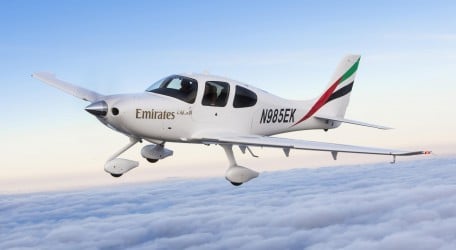
Emirates Flight Training Academy orders 27 aircraft
US $39 million investment in Cirrus and Embraer airplanes underscores Emirates’ commitment to train cadet pilots in Dubai using the most modern facilities and techniques
Emirates Flight Training Academy, developed by Emirates airline to address its growing need for pilots, has signed an agreement with Cirrus Aircraft and Embraer to order 27 new aircraft. The order includes 22 single-piston engine Cirrus SR22’s and 5 twin-jet Embraer Phenom 100E, which are valued at more than $39 million dollars at list prices.
The aircraft, which will be delivered starting in 2017, will be used by cadet pilots as they train to become fully-qualified commercial pilots for Emirates. This order will allow Emirates Flight Training Academy cadet pilots to receive, for the first time, 100% of their training in Dubai. Previously, cadet pilots underwent a majority of their training at a variety of locations overseas.
Adel Al Redha, Emirates Executive Vice President and Chief Operations Officer, said: “Industry forecasts show growth in the need of pilots particularly over the next few years. The Emirates Flight Training Academy is our investment and response to this pressing need. The academy will offer training programmes using the latest available technology and advanced aircraft. While the biggest beneficiary of this programme is Emirates, it’s our plan to offer the programme to external candidates around the world.”
The Emirates Flight Training Academy will initially focus on Emirates’ existing cadet pilot programme for UAE nationals, with the aim to expand intake to other candidates in the future.
Once accepted into the cadet programme, students will be provided on campus accommodation and will undergo rigorous ground training. After completing this component of their education, they will begin their in-flight training on the Cirrus SR22 aircraft to learn basic commercial piloting skills. Cadets will then advance to the Embraer Phenom 100E aircraft to obtain their twin engine jet rating and their Commercial Pilot License on a multi-engine aircraft with Instrument Rating, and frozen Airline Transport Pilot’s License (ATPL).
In traditional cadet programmes, students move from single-engine piston aircraft to twin-engine piston aircraft before transitioning to jet airplanes. With the Emirates Flight Training Academy, students move from the single-engine piston Cirrus SR22 directly to the jet-powered Embraer Phenom 100E. This eliminates an extra step in becoming a commercial pilot and gives cadet pilots an enhanced curriculum during single engine training, as well as more experience flying jet aircraft before being trained as an official Emirates pilot. Overall, the programme including ground school, flying and simulator training lasts three and a half years.
Cirrus SR22
As the backbone of the Emirates Flight Training Academy fleet, the Cirrus SR22 aircraft has a modern composite airframe; two large 12” flight displays; a flight management system keypad controller and an integrated engine indication and crew alerting system. The Emirates order includes 22 aircraft, with the option to purchase an additional 10 in the future.
“Our partnership with the Emirates Flight Training Academy demonstrates immense forward momentum within the global aviation industry,” stated Dale Klapmeier, Co-Founder and CEO of Cirrus Aircraft. Embraer Phenom 100E
Emirates’ order of five Embraer Phenom 100E represents the largest in the aircraft type’s history to be used for flight training purposes.
“Emirates’ dedicated flight training centre offers one of the industry’s most innovative and advanced airline pilot training programmes,” said Marco Tulio Pellegrini, President & CEO, Embraer Executive Jets. “We are pleased to be one of Emirates’ key partners by providing them the jet training aircraft adopted to fulfil their future demand for highly skilled professional airline pilots.”
Emirates Flight Training Academy Facility
Each of the newly-ordered aircraft will be based at the Emirates Flight Training Academy facility, which is currently under construction at Al Maktoum International-Dubai World Central (DWC). Once completed, the Academy will be able to accommodate up to 500 cadet pilots at a time.
The facility will include ground school classrooms, ab initio flight training, ground-based simulators, a dedicated runway, maintenance centre, housing accommodations for men and women, a gym, football pitch, tennis courts and a mosque.
Emirates operates a daily scheduled flight between Dubai and Malta via Larnaca, Cyprus. For further information and flight schedules, one can visit the site: www.emirates.com/mt
- November 13, 2015 No comments Posted in: Press Launches Tags: Emirates Flight Training Academy





